Santorum and his Theology
Santorum and stewardship of the Earth.
It’s felt like all Santorum all the time here recently, and with good reason: he’s the latest non-Romney and in some polls leads Romney nationally. There isn’t enough tea in China to get me to vote for Santorum in any circumstance, but we can add this article by James Wood to the list of weird things about the Republican candidates in this election cycle:
If Rick Santorum is so staunch a Catholic, why does he often sound such a Protestant, not to say puritanical, note? His remarks about how President Obama’s world view is just “some phony theology” have received a lot of attention but too little examination. It turned out that Santorum was talking, in general terms, about “radical environmentalists,” and using environmentalism as a synecdoche for everything he abominates in secular progressive politics. “This idea that man is here to serve the earth as opposed to husband its resources and be good stewards of the earth” is, he maintained on CBS’s “Face the Nation,” “a phony ideal. I don’t believe that’s what we’re here to do. That man is here to use the resources and use them wisely, to care for the earth, to be a steward of the earth. But we’re not here to serve the earth. The earth is not the objective. Man is the objective, and I think a lot of radical environmentalists have it upside-down.” That kind of ideology, he complained, “elevates the earth above man.”
[…]
Of course, it is not possible to put theology aside. I know the theological weight of that word, “steward.” When I was a boy, my mother, in the grip of her Scottish evangelical Protestantism, used to chide me for my untidy bedroom, adding that, as a Christian, it was an example of “poor stewardship.” Everything is the Lord’s, and our brief role on earth is merely to husband it in a right way, a way that gives the Lord His due. Christianity, with its emphasis on the afterlife, has always had a tendency to derogate earthly living as a kind of spectral vanity. And the early Christians, who like St. Paul were convinced that Jesus’s return, and thus the end of the known world, was imminent, had particular reason to treat life as a ghostly antechamber to the joys of eternity. There is a sharp difference between the other-worldly asceticism of Christianity and the life-filled practicality of Biblical Judaism, which has a vague or non-existent notion of the afterlife. It was this asceticism, among other irritants, that caused Nietzsche to accuse Christianity of turning life upside-down—of privileging sickness over health, weakness over strength, the life to come over the life here. “Christianity was, from the beginning, essentially and fundamentally, nausea and disgust with life, merely concealed behind, masked by, dressed up as, faith in ‘another’ or ‘better’ life,” he wrote in “The Birth of Tragedy.” As the secularist might see it, Santorum is the one who has got things upside-down.
[…]
So when Santorum says that we must be good stewards of the earth, there is religious zealotry behind the sweet words. He is proposing, in effect, that the earth is dispensable but that our souls are not; that we will all outlive the earth, whether in heaven or hell. The point is not that he is elevating man above the earth; it is that he is separating man and earth. If President Obama really does elevate earth over man (accepting Santorum’s absurd premise for a moment), then at least he believes in keeping man and earth together. Santorum’s brand of elevation involves severing man from man’s earthly existence, which is why it is coherent only within a theological eschatology (a theology of the last days). And he may well believe that man cannot actually destroy the earth through such violence as global warming, for the perfectly orthodox theological reason that the earth will come to an end (or be renewed) only when Christ comes again to judge the living and the dead. In other words, global warming can’t exist because it is not in God’s providential plan: the Lord will decide when the earth expires. This is Santorum’s “theology,” phony or otherwise.
Well, where to start? I think that the article’s author, Mr. Wood, is making the word “steward” do a lot of work for him, but given some of the things Santorum has said, like his references to Satan and the notion that President Obama is looking to indoctrinate kids by sending them to college, it can’t be dismissed. He clearly has some kooky ideas.
Also, as someone who grew up Catholic, it has occurred to me more than once that he sounds more like an evangelical Protestant than a Catholic, excepting his obsession with birth control and sex in general. Santorum is also clearly a global warming denier, which would fit with Wood’s thesis.
As I said in the beginning of this post, I would never vote for him anyway. However, I’m still astounded by the number of kooks who have been taken seriously in this primary. Hopefully, when they lose this election, the Republicans will do a little soul searching and field some better candidates next time.
Via Jerry Coyne.
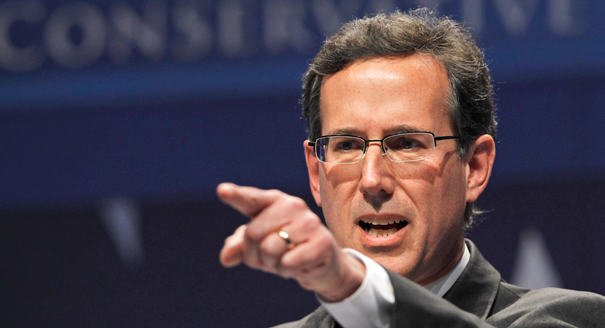

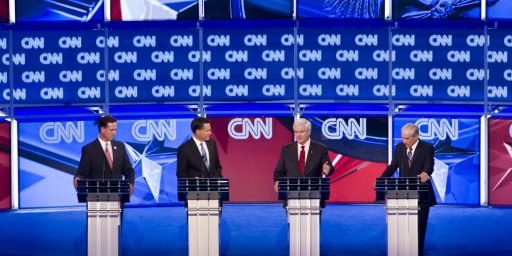

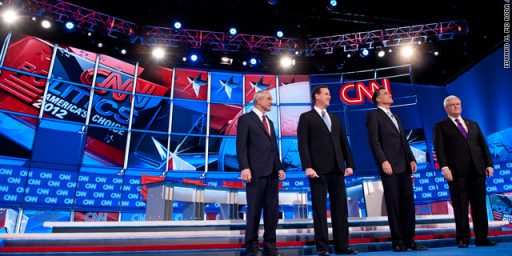
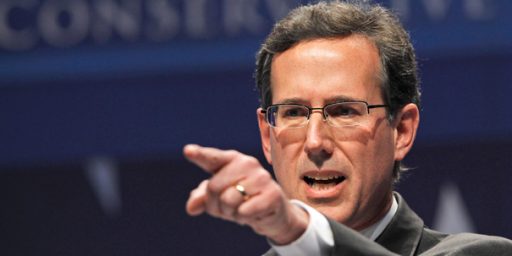
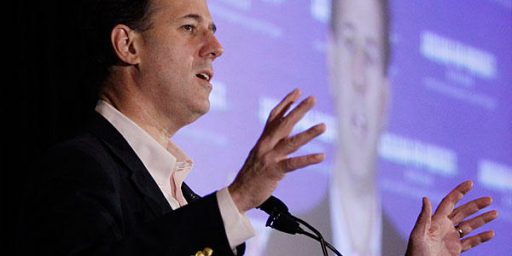
Much of what most American Protestants know about Catholicism they got from watching a couple of Bing Crosby movies, or the ones where Spencer Tracy or Pat O’Brien saved those rough-but-really-good-inside inner city kids from a life of crime. There’s a pretty strong assumption that Catholics simply salute and do whatever the bishops/cardinals/pope tell us to do.
Long before Martin Luther nailed his 95 theses up on the door of Wittenburg Cathedral and kicked off the mother of all interdenominational fueds, the Catholic Church saw internal differences and made room (often unwillingly) for differing interpretations. The same medieval popes who accepted gold and land from kings and princes, also (sometimes grudgingly) approved the existence of the Franciscan order whose members eschewed all worldly goods.
The Catholic Church is a mighty big tent, and I have never recognized it in Santorum’s words which seem some kind of weird parody of a more authoritarian doctrine.
@DRS: Well put. Aside from the birth control thing, he doesn’t seem overly Catholic to me.
Why? It is what the base wants.
Don’t hold your breath Robert. I have feeling they will double down on the crazy because that is what they do now. Besides, in another 4 years they will probably have run all the sane people out of the party.
Well, I think the linked piece reads like a leftover college paper wrought with namedropping of important things I’ve read in cliff-notes, I agree Santorum has sounded more conservative* Protestant. I wonder if its innate in his belief system, or it reflects a conscious point of emphasis in attracting evangelical Protestant voters?
* I think conservative is the better word here, some evangelicals include environmental activism as part of their religious quest to build a new Jerusalem.
@OzarkHillbilly: They might double down, but I would love to believe that we’ll have two functional parties.
When Obama and the Democrats won everything three years ago, the big question many asked was “is the U.S. still a center right country?” You could argue that the Republican Party center right in recent years. I would love to see us have that again: a center left party and a center right party. It would be more helpful than what we have now.
@PD Shaw: When I said the word “steward” was doing a lot of work for him, I came close to saying that the piece was overwrought. The problem with that is that the Republicans have done some incredibly stupid things recently, including: the debt ceiling debacle; the Tea Party movement as a whole; referring to Obama as a socialist, etc.
I agree that conservative is a better word than evangelical, for the reason you stated.
There is, in the Catholic Church, an official heresy called Amercianism:
Santorum’s theology can be almost entirlye explained as a belief that this heresy is the biggest spiritual threat to our country and that it’s his mission to “save” us from it.
He has long sounded more like a fundamentalist evangelical than a Catholic to me as well (save on the noted issue of birth control and sex-as-procreation).
And the stewardship argument noted in the post sound very much like anti-environmentalism arguments I have heard from some fundamentalist evangelicals over the years (especially in my youth).
@Steven L. Taylor:
What exactly is a Catholic supposed to sound like? I was raised Catholic and don’t find Santorum’s rhetoric on religious issues all that unusual. it’s a reflection of the fact that the Church itself has become more conservative (in a theological sense) since the Papacy of John Paul II.
@Stormy Dragon: I had never seen that before and thanks for sharing it.
@Doug Mataconis: Fair enough. And I will confess that I am not sure, without giving it a lot of thought, how I would want to break it down.
I have some cross-over experience, having been raised Southern Baptist and yet having attended a Catholic school for two years (but that was elementary school, and a long time ago).
At a minimum he seems more, well, evangelical (in the sense of evangelizing) than most Catholics I have encountered both personally, but also in observing in public life.
@Steven L. Taylor: That’s what I heard in my youth, too, though not very much and never from Catholics I was around. I always interpreted the stewardship notion as taking care of God’s creation and the like, which seems much more sensible to me.
BTW, I didn’t notice your post on almost exactly this subject from a couple of days ago until after I submitted. Your post is better, I simply introduced the Catholic angle. I didn’t mean to be redundant.
@Doug Mataconis: I haven’t been an active Catholic in at least 15 years, but I would still be surprised if it changed that much. I’m not saying you’re wrong, but I was under the impression that the Church stayed the same — especially on birth control and abortion — and the society got more socially liberal, not so much that the Church became more conservative.
@Robert Prather:
No worries (and kind of you to say). And I think it i more than fair to have similar topics addressed (and I would consider this post an expansion on a theme rather than a redundancies).
I should also add that most of the evangelical Christians I knew growing up in the early to mid 80s seemed focused on the twin evils of alcohol and rock music.
I’m not sure if I put it correctly in saying the Church became more conservative, but there has something of a push back against many of the Vatican II reforms and an increase in what one might call Catholic Traditionalism.
The other thing to remember about Santorum’s rhetoric is that he is a politician and he is no doubt tailoring his message to his audience.
This was interesting:
How the Catholic Church almost came to accept birth control.
It was a Catholic Doctor that developed the pill.
@Doug Mataconis:
He’s certainly doing that in some respects, but his harping on birth control confuses me. That’s a truly radical and unpopular position these days.
Still, I see one area where it might still appeal to evangelicals. Remember the HPV vaccine controversy? I think the bit about not vaccinating girls originated with evangelicals, though I going from memory. I’ll tell you, female sexuality scares some people to death.
@Ron Beasley: I hadn’t seen that. Thanks.
If santorum’s position is that man is supposed to be a “good steward” of the earth, when is he going to oppose the GOP’s environmental policies, which are activly hostile to the earth?
“If Rick Santorum is so staunch a Catholic, why does he often sound such a Protestant, not to say puritanical, note? ”
Does this resonate?
@OzarkHillbilly: The repub base is about 100% kooks. The people that are running now have to be kooks like Santorum or liars like Willard to appeal to them. These people are all they have.
for some thoughtful, timely, and balanced thoughts about religion in life and politics, read some articles at: albertmohler.com
@anjin-san:
He won’t, because of the dominionism mentioned above.
@sam: Was the guy who wrote that Protestant or Catholic?
@merl: If the Republicans keep acting this way, they’ll hopefully end up a much smaller party and hopefully for a very long time. It’s the only thing that will return their sanity.
@Robert Prather:
Yeah, but you gotta deconstruct that: Alcohol + Rock Music = SEX.
(Which is what all this stuff comes around to sooner or later.)
A little OT, but since we’re talking about puritanism and sex…
A preacher in one of the early New England communities stood before his flock and began his sermon thusly:
“Brother and sisters, we’ve reached a sorry pass here. Men are fornicating with other men’s wives. They are fornicating with their daughters; they are fornicating with young men; they are fornicating with dogs; they are fornicating with pigs; they are fornicating with sheep; they are fornicating with horses; they are fornicating with chickens.”
A guy at the back of the hall says, “Chickens!!??”
“We’re not here to serve the earth” is the most transparent strawman I’ve seen all month. We must not stop raping the world, lest we serve it.
Santorum’s statements are very much in line with certain varieties of conservative Catholicism. Some of my relatives are strong adherents to that, and I’ve heard much the same declarations as his from them at times. I’d be somewhat interested to hear his positions on the Latin mass and on Vatican II as a bellwether, but I suspect it’d be very “inside baseball”/boring to anyone not interested in Catholic theology.
If you look at what Santorum actually said, as compared to all the additional freight that Wood is ascribing onto them, his statements on environmentalism are in line with the conservationist tradition, as compared to the “deep ecology” perspective which has characterized the green movement in recent decades. In that sense, he’s more mainstream on that than Wood makes him out to be.
Santorum is a “global warming skeptic.” “Denier” is an unnecessarily pejorative phrase, like calling someone a “teabagger” or “wingbat” or “chicken hawk.” Using any of those as a normal turn of speech is symptomatic of hanging around the same discussion crowd too much.